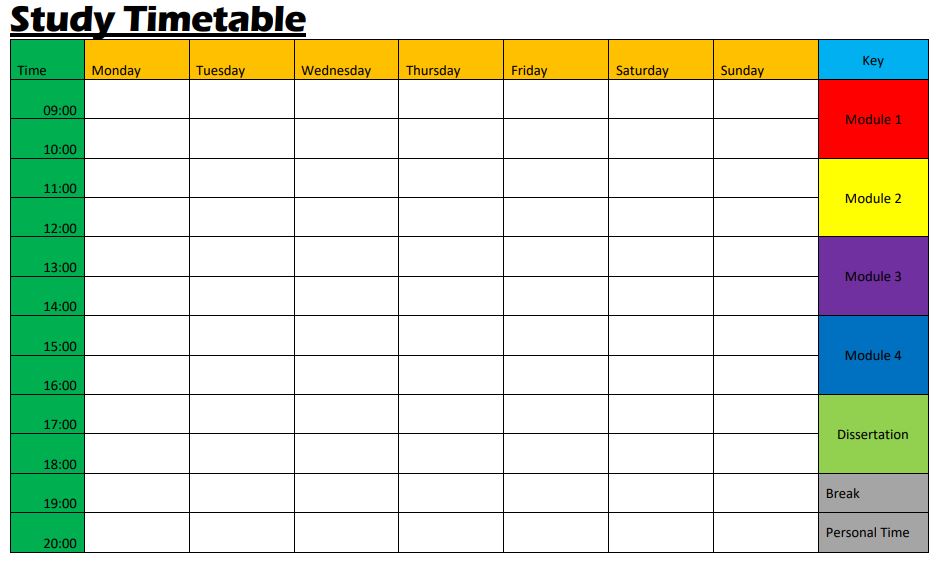Winston Churchill famously noted that we should “Let our advance worrying become advance thinking and planning.” Whether you’re just starting your first semester as an undergraduate or juggling work alongside postgraduate study, the key to academic success is to make time to plan ahead. The busy student schedule and academic demands mean it is impossible to remember every task and deadline if you want to do a good job. In our experience, managing your deadlines and the time you allocate to each of them ultimately becomes a mind game, and it’s that experience that forms the crux of what we would recommend in our top tips below to ensure good time management:
- Weekly Schedule – The first thing you could do is find a way to visualise your time in a clear, digestible way. This can be an unattractive suggestion. After all of your other commitments, you may not have a lot, and somehow, you’ll need to fit your studies within that – see how it’s a mind game? Make a list of all your commitments (this will look different for everyone) that you must do, then plot them on a weekly planner template. This will help you see where you have ‘dead time’ that can be better utilised. You can use simple templates like the one below, or OneNote is an excellent piece of software for organising a planner, which you can learn more about on this LinkedIn Course.

- Physical Planner – Using a week to a page planner enables you to quickly note deadlines, meetings, or sessions that are non-negotiable. Put assessment deadlines in your diary one week earlier than they are due to give you more breathing space for additional proofreading and editing, or to upload to Turnitin early to avoid the last-minute panic – and stick to this deadline! This also gives you a few days of breathing space to have a clear mind before moving on to the next assessment.
So now you have a way to visualise your workload and the time you have to tackle it. But you’ll also need a strategy to make the best use of that time. You could start with the deadline that looms closest, but before you commit, it’s worth thinking about other approaches. There’s likely a period where several assignments are due all at the same time. Is it better to tackle one of those first to ease your workload when that time comes? It may be that a subject in one of your modules has interested you, in which case, why not strike while the iron is hot and allow your inspiration to be your driving force? Once you’ve decided on a strategy, we’ve got the perfect way to help you keep on top of your task list…
- Kanban Board – Kanban is an agile working technique used in manufacturing, but in a simplified form, it can be used for study. At the start of the year, write all your assessment pieces and deadlines on post-its, then stick them in the to-do column (as in the picture below). It may seem overwhelming, but it really works. The key is to work on no more than three tasks at any one time. It is also rewarding to see how far you have come when everything is in the completed column at the end of the year. This LinkedIn Learning course is beneficial in understanding using Trello for Kanban.

- Get weekly note-taking organised – Making good notes as you read will help with time management around assessment deadlines. Samantha Hutchinson wrote some fantastic tips on this Inside Edge blog about some key strategies to use.
These are just some suggestions that may help you, but don’t let that stop you from discovering more of your own! There are also lots more tips on the Inside Edge Student blogs page. If we can do it, anyone can! Learning Services run a range of UniSkills Sessions to help you develop strategies to get organised and manage your time which can be found here. You can also access this great Efficient Time Management LinkedIn course. As we’ve said, time management can become a bit of a mind game, but please don’t be afraid to seek support if you feel overwhelmed at any time. There are structures in place dedicated to supporting you, which you can find more information on here on the EHU Wellbeing page.
By Michelle Hopwood and Eoin Malone



